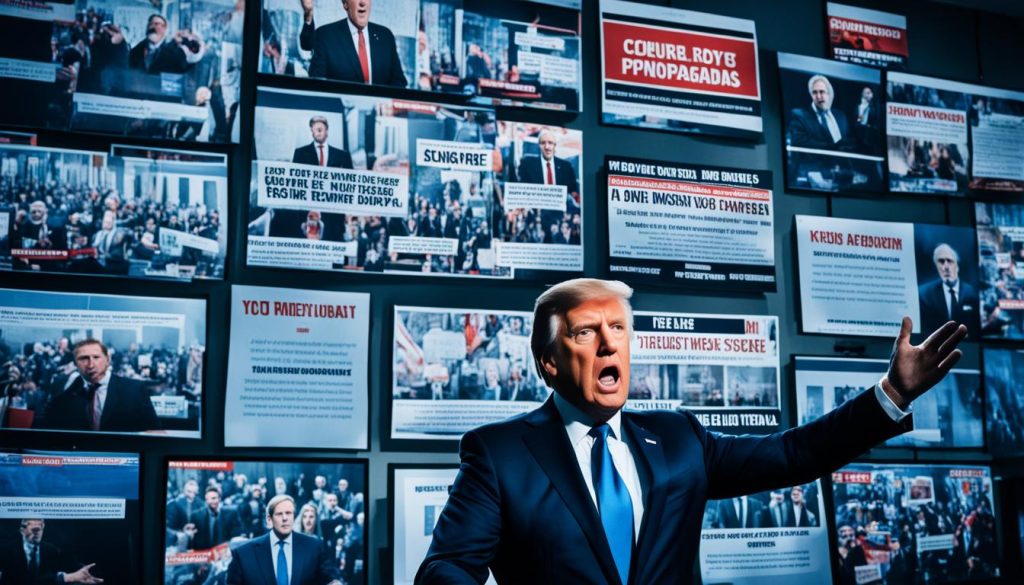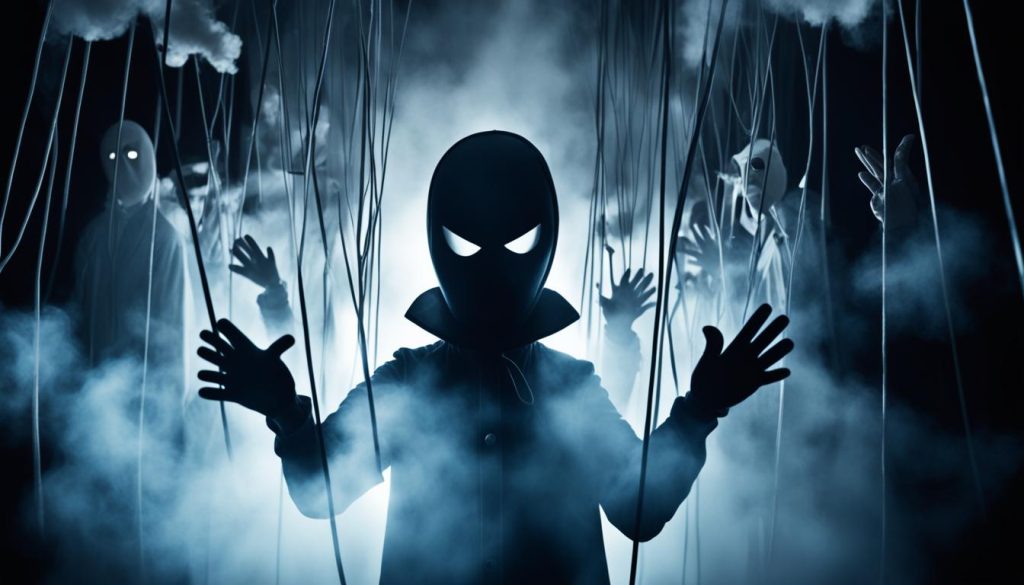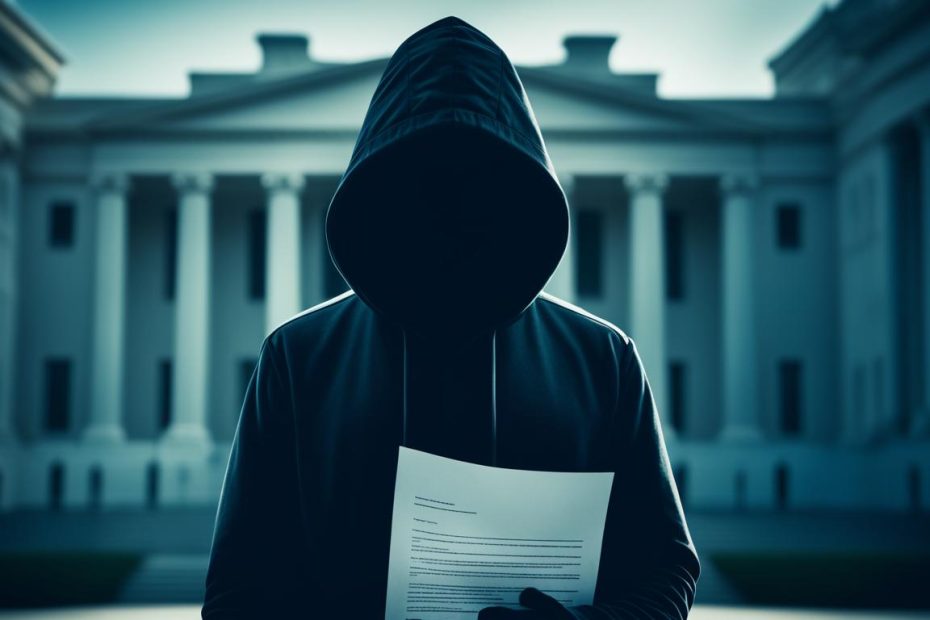In a world where power and secrecy mix, government secrets often hide the truth. Whistleblowers reveal classified documents, and intelligence agencies work in secret. This article explores the hidden forces that shape our world. We’ll look at government conspiracy, covert operations, whistleblowers, and classified documents. We’ll see how intelligence agencies, cover-ups, disinformation campaigns, and political scandals affect us. Get ready for a journey that will change how you see things. It will help you know what’s real and what’s not in the areas of freedom of information and the surveillance state.
Key Takeaways
- Uncover the hidden truth behind government conspiracies and covert operations.
- Explore the role of whistleblowers and the impact of classified documents.
- Understand the influence of intelligence agencies, cover-ups, and disinformation campaigns.
- Examine the impact of political scandals and the importance of freedom of information.
- Navigate the complexities of the surveillance state and separate fact from fiction.
Decoding the Veil of Secrecy
In the world of government secrets, whistleblowers are seen as both heroes and traitors. They risk everything to reveal classified documents and secrets. These brave individuals feel a strong moral duty to expose the hidden actions of intelligence agencies and political groups.
Whistleblowers: Heroes or Traitors?
People like Edward Snowden and Chelsea Manning have risked their freedom to expose wrongdoings. They’ve shown the misuse of power, human rights abuses, and attacks on democracy. This has sparked debates, with some seeing them as champions of truth and others calling them traitors.
Whistleblowers face a tough choice. They must decide between their personal safety and revealing the truth. Their actions often clash with the institutions they once worked for, leading to a tough journey of personal and professional change.
Classified Documents: A Double-Edged Sword
Classified documents are crucial for intelligence agencies but can also be dangerous. They’re meant to protect national security but can be used for cover-ups and against whistleblowers.
The debate over national security and public right to know is ongoing. Both sides argue their point, showing the need for a transparent system. This system must balance security with the freedom of a well-informed public.
“The truth will set you free, but first it will piss you off.” – Gloria Steinem
The battle between whistleblowers and intelligence agencies affects us all. We’re left to sort through cover-ups and classified documents to find the truth. Finding a balance between security and democracy is key.
Intelligence Agencies: Guardians or Manipulators?
Intelligence agencies are key in national security, gathering and analyzing info to protect us. But, they often hide secrets and spread false info, making us question their real goals.
Is it right to see them as our protectors or as those who control what we think? The line between keeping us safe and being open is blurry. Whistleblowers and journalists are showing us the dark side of these groups.
- The impact of cover-ups on public trust in government institutions
- The use of disinformation campaigns to sway public opinion and obscure the truth
- The ethical dilemma faced by intelligence agencies: protecting national interests or abusing their power?
Looking closer at these agencies, we see a scary truth. The ones we trust to keep us safe might be the ones lying to us. Finding the truth and holding them accountable is more important than ever. We need to know why they hide so much.
“The greatest enemy of the truth is not the lie, deliberate, contrived, and dishonest, but the myth, persistent, persuasive, and unrealistic.” – John F. Kennedy
By looking closely at what these agencies do, we learn about the tricky balance between safety and our right to know. This search for truth might reveal hard facts. But it’s key to making sure our protectors stay true to their word and don’t let us down.
Cover-ups: Hiding the Truth in Plain Sight
Governments and institutions often hide the truth. They do this to keep power. This means they keep secrets, even when they should be open.
From top politicians to secret agencies, they keep a lot hidden. They hide the bad things leaders do.
Political Scandals: Exposing the Unspeakable
When political scandals come out, they show us the real truth. These scandals reveal how leaders often don’t trust us. They use cover-ups to hide their wrongdoings.
Scandals can be about many things like corruption or hiding important info. They can even threaten the whole idea of democracy.
| Scandal | Implications | Outcome |
|---|---|---|
| Watergate Scandal | Abuse of power, illegal surveillance, and cover-ups | Resignation of President Richard Nixon |
| Enron Scandal | Fraud, cover-ups, and financial misconduct | Collapse of the Enron Corporation and criminal convictions |
| Tuskegee Syphilis Study | Unethical medical experimentation and cover-ups | Public outrage and lasting damage to the medical community’s trust |
These political scandals show us that leaders often lie to us. When we find out, it can really shake our trust in them. It shows us the bad things they do in secret.
As trust in leaders drops, we need them to be more open. When we see cover-ups and scandals, it wakes us up. It tells us that wanting power can lead to big problems for our democracy.
Disinformation Campaigns: Weaponizing Perception
In today’s world, governments and groups with special interests have mastered the art of spreading false information. They aim to change what people think, hide the truth, and create conflict. They use social media’s speed and reach to spread their lies.
Freedom of Information: Unveiling the Curtain
The right to know what our leaders do is key to fighting lies. Laws that let us see what’s happening in government keep us safe from being misled. They make sure we can check on how decisions are made and where our tax money goes.
But, getting the truth is hard because those in power don’t want to share everything. They say it’s for our safety or security. This fight between what we should know and what they want to keep secret is a big part of the battle against false information.
- Disinformation campaigns use propaganda, fake news, and online tricks to shape what we think.
- Laws that let us see government info are key to fighting back against these tricks.
- It’s hard to get the truth because those in power often don’t want to share it.
| Tactic | Description | Impact |
|---|---|---|
| Propaganda | Messages made to push a certain political view or story. | Changes what people think by picking and choosing what to share. |
| Fake News | False or misleading info passed off as true, often on social media. | Undermines trust in real news and causes confusion and division. |
| Online Manipulation | Using bots, trolls, and digital tricks to spread false info. | Overwhelms real voices, making it hard to know what’s true. |

“The greatest weapon of mass destruction is the manipulation of perception.”
The fight against false information is ongoing. Our right to know is crucial for finding the truth and holding those in power accountable. By using our freedom of information, we can expose secrets and make better choices. This strengthens our democracy.
The Surveillance State: Orwellian Nightmare or Necessary Evil?
The idea of a surveillance state has sparked a big debate. People argue about whether it’s right to give up privacy for safety. Supporters say it’s key to keeping society safe. But critics fear it could lead to a big loss of freedom.
At the center of this debate is a tricky balance. Supporters say giving agencies access to our data helps fight terrorism and crime. They believe a strong surveillance state keeps us safe and protects our freedoms.
But, those who care about our rights disagree. They say more surveillance means the government can watch and control us too much. This reminds us of George Orwell’s scary “1984.”
| Proponents of the Surveillance State | Critics of the Surveillance State |
|---|---|
|
|
This debate is ongoing. We’re asking: Is the surveillance state needed, or is it too much? Finding the right balance between safety and freedom is key. This is a big issue we’re still discussing.
“Who controls the past controls the future. Who controls the present controls the past.”
– George Orwell, “1984”
Covert Operations: The Invisible Hand of Power
In the world of government secrets, covert operations are often hidden but powerful. These secret actions, done by intelligence agencies and political leaders, can change history. But, their real effects are usually unknown to the public.
What happens when we lift the secrecy and reveal the hidden truths?
i apologize, but Some Truths are Better Left Unsaid
We all want transparency and accountability in government. Yet, sometimes some truths are better left unsaid. The covert operations by intelligence agencies are often needed for national security. But, they can also have bad effects if everyone knew about them.
Whistleblowers might reveal shocking information. But, the effects of such revelations can be big and complicated.
We face a tough question: Is the public’s right to know always most important, or are there times to keep covert operations secret for the greater good? Finding the right balance is crucial for both governments and citizens.

Exploring covert operations and government secrets shows us the complexity of truth. While seeking truth is important, sometimes we must say i apologize. This is to protect our society from harm.
Government Conspiracy: Separating Fact from Fiction
In the complex world of government conspiracies, it’s hard to know what’s true and what’s not. But, with the right strategies and tools, we can find the facts. We’ll look at how to spot credible sources, check the evidence, and decide if government conspiracy claims are true.
First, we need to look at conspiracy theories with a critical eye. We should be aware of our own biases and look for different views. By checking multiple sources, we can start to find the truth behind these claims.
It’s also key to find trustworthy sources of information. Government reports, academic studies, and respected journalism can help us understand government workings. But, we should be careful of sensational media, unverified online info, and claims from unknown sources or shady groups.
| Credible Sources | Questionable Sources |
|---|---|
|
|
By looking closely at the evidence and the sources, we can tell what’s real in government conspiracy theories from what’s not. This takes patience, critical thinking, and a readiness to question our beliefs. It’s key to making informed choices about these complex topics.
Dealing with government conspiracies needs a balanced view. By using the strategies we’ve talked about, we can go past the hype and find the real truths. This helps us make informed judgments about government power and its openness.
Unraveling the Conspiracy Web
Exploring government conspiracies is like trying to untangle a complex web. It’s hard but possible with careful attention and a step-by-step approach. By looking closely and methodically, we can find the hidden truths.
Following the Trail of Breadcrumbs
Uncovering the truth starts with following clues from whistleblowers, secret documents, and investigative reporters. By combining these pieces of information and checking them against other sources, we start to see the big picture. This helps us understand the hidden stories that are kept from us.
This careful work reveals the secret operations, hidden information, and power structures behind government conspiracies. With this insight, we can grasp the reasons, the people involved, and the big effects on our world.
FAQ
What is the role of whistleblowers in exposing government secrets?
Whistleblowers are key in revealing government secrets and exposing hidden operations. They can be seen as heroes or traitors, depending on the view. This brings up complex ethical questions with big effects.
How do classified documents impact the balance between transparency and national security?
Classified documents are tricky. They keep vital info safe but can also hide the truth. This makes it hard for the public to get the full story.
What is the role of intelligence agencies in government conspiracies?
Intelligence agencies protect national security but can sometimes cross lines. It’s important to look into how they handle cover-ups and spread false info to understand their role.
How do government cover-ups influence political scandals?
Cover-ups try to hide the truth. When they’re uncovered, they can lead to big political scandals. These expose the bad actions of those in power.
What is the impact of disinformation campaigns on public perception?
Disinformation campaigns aim to shape public opinion. Knowing how they work helps us tell what’s real from what’s not. This is key to seeing through the secrecy.
Is the surveillance state a necessary evil or an Orwellian nightmare?
The debate on the surveillance state is ongoing. Some say it’s needed for safety, others see it as a threat to privacy. Finding the right balance is a big challenge.
What are the implications of covert operations, and should some truths be left unsaid?
Covert operations are secret actions by governments and agencies. While they can be seen as necessary, revealing them can cause more harm than good. Sometimes, it’s better to keep some secrets.
How can one separate fact from fiction when it comes to government conspiracies?
Sorting out truth from lies in government theories needs careful thought. It’s important to know where to find trustworthy info. This helps us see through the deception.
What steps can one take to unravel the conspiracy web?
To untangle conspiracy theories, start by looking for clues and connecting dots. With the right skills and info, we can confidently figure out the truth in these complex situations.
